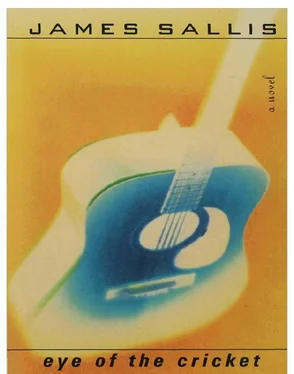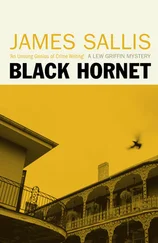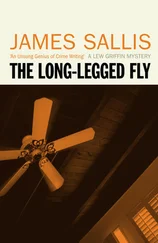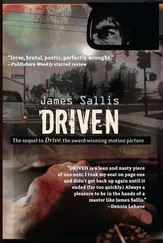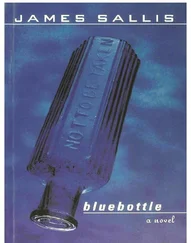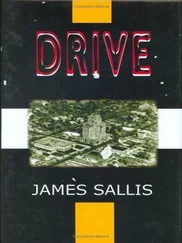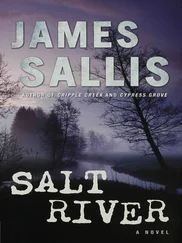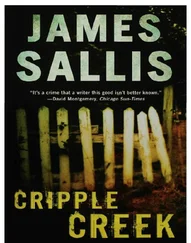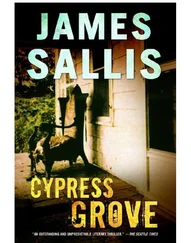James Sallis - Eye of the Cricket
Здесь есть возможность читать онлайн «James Sallis - Eye of the Cricket» весь текст электронной книги совершенно бесплатно (целиком полную версию без сокращений). В некоторых случаях можно слушать аудио, скачать через торрент в формате fb2 и присутствует краткое содержание. Жанр: Криминальный детектив, на английском языке. Описание произведения, (предисловие) а так же отзывы посетителей доступны на портале библиотеки ЛибКат.
- Название:Eye of the Cricket
- Автор:
- Жанр:
- Год:неизвестен
- ISBN:нет данных
- Рейтинг книги:3 / 5. Голосов: 1
-
Избранное:Добавить в избранное
- Отзывы:
-
Ваша оценка:
- 60
- 1
- 2
- 3
- 4
- 5
Eye of the Cricket: краткое содержание, описание и аннотация
Предлагаем к чтению аннотацию, описание, краткое содержание или предисловие (зависит от того, что написал сам автор книги «Eye of the Cricket»). Если вы не нашли необходимую информацию о книге — напишите в комментариях, мы постараемся отыскать её.
Eye of the Cricket — читать онлайн бесплатно полную книгу (весь текст) целиком
Ниже представлен текст книги, разбитый по страницам. Система сохранения места последней прочитанной страницы, позволяет с удобством читать онлайн бесплатно книгу «Eye of the Cricket», без необходимости каждый раз заново искать на чём Вы остановились. Поставьте закладку, и сможете в любой момент перейти на страницу, на которой закончили чтение.
Интервал:
Закладка:
Afterwards, then, we repaired to Rue de la Course, there over French roast, Earl Grey and biscotti to speak of grand ideas, ambition, disappointment, highrent and sleeping alone, ghosts, phantoms, demands of the past.
This part of town had just begun to crawl out from under years of abandon and disrepair as firstyoung people, then investors, bought up the old Humpty-Dumpty houses and started putting them back together again. Even now, this late at night, a crew was at work across the street on a swayback Colonial double, portions of which had been painted dull silver, like aircraft models. Three men on ladders, spotlights directed up towards them as they scraped, sandpapered, sprayed, and hammered.
Deborah sat watching them. "You sure it wasn't too pretentious?"
No. Want another tea?
Why not.
I went inside. When I came out balancing full mugs, the workers across the street had stopped and begun packing everything-wire brushes, sanders, paint, ladders, toolboxes, toolbelts, lights-into trucks and hatchbacks.
"Thanks," Deborah said. She drank. "What part did you like best?"
"Intellectually?"
"Whatever."
"Okay. I have to tell you: I found the guy wandering around nude in the audience a realturn-on."
"Yeah. Me too. Youreadyto go, Lewis?"
O yes.
17
Years ago a New Orleans friend named Chris Smither wrote a song called "Love You Like a Man," a fierce, intensely physical encomium detailing what his woman needs, what she's not going to find elsewhere and what he can do if she'd only give him the chance; these days, Chris says up in Boston where he lives now, he performs it chiefly as a nostalgia piece.
However we might laugh it off, over time our lives' landmark days become more commemorative than celebratory. Passing yearsfind us able to care passionately about less and less. Less becomes what we're capable of as well, physically, emotionally-andfinally what we hope for, what we believe still possible.
No: not the precis of another heady discussion with Deborah O'Neil, though it might have been. And though Deborah was directly responsible. For as I came to spend more and more time with her, within myself I sensed all manner of rumblings and unsettlings, felt systems I'd thought shut down for good start kicking over again.
Lights flare, dim, dim further still-and finally catch. The survivors let out a long breath.
The long-disused engine turns over once, again, stalls with power surging audibly towards it before stuttering into full bloom. The castaways will be able to escape after all.
It's alive! spectators cry out in horror films.
Holy words.
Somehow we go on being given new chances.
— What I was thinking Sunday night (or Monday morning, whichever shore you watched from), having left Deborah's a little after one. Lying with body exhausted, mind chugging away, in a bamboolike shaft of moonlight.
Late that afternoon I'd come home and, on my hurried way towards a shower and new clothes, gone into the kitchen for a bottle of water only tofindrefrigerator, pantry and shelves stocked for the firsttime in years. With no one to cook for, I'd long ago given it up. I ate out or nibbled at plates of cheese, crackers, sausage, raw vegetables.
A note scrawled in huge printed letters across three sheets of 8 V amp; X 11 paper, taped to the refrigerator door like a child's school drawings put up on display, read:
I FRIED YOUR LAST EGG FOR BREAKFAST.
IT WAS RIPE. THEN AS YOU MAY HAVE NOTICED I WENT SHOPPING. SOMEONE HAS TO. FIGURE SINCE I DON'T HAVE A JOB I'LL TAKE UP A HOBBY AT LEAST AND GET DOWN TO SOME 60URMET COOKING. ALWAYS MEANT TO. NOTICED HOW THE GUTTERS ARE ALL CHOCKFULL BY THE WAY. THEY AND MOST OF THE SHUTTERS DONE PULLED WAY FROM THE WALL. FIGURE I CAN FIX THAT THE NEXT DAY OR TWO IF IT'S OKAY WITH YOU. THERE'S SOME OTHER STUFF TOO. WE CAN TALK ABOUT IT. PROBABLY NEVER TOLD YOU, BUT MY OLD MAN WAS A CARPENTER, HANDYMAN, UP ROUND TUPELO. I WAS ALWAYS KIND OF ASHAMED OF HIM WHEN I WAS A KID. I'LL BE OUT LOOKING FOR WORK WHILE YOU'RE OUT WORKING. LET ME KNOW WHEN YOU'LL BE HOME AND THERE'LL BE A HOT MEAL WAITING. THANKS, ZEKE P.S. I STARTED THE NOVEL THIS AFTERNOON, I'D JUST WATCHED ZEBRAHEAD ON TV. AMAZING, ALL THIS CABLE CHANNEL STUFF. CALLING THE GUY IN MY BOOK LEW GRIFFIN FOR NOW. THAT OKAY?
Of the six messages on my answering machine, the most important was from Tulane, basically Hello? hello? is anyone there? Like a message launched blindly into space.
I would have called back right then, but nobody'd be around on Sunday afternoon. I'd missed, what, one class? It seemed like more. This week had been all over the damn place. Felt as though I needed a map and one of those time-lines-of-history charts.
"So many things happen to us," Deborah said, arm passing into light from the window as she gathered the pink cotton blanket loosely about her. She sat, knees drawn up, against the headboard. "How are we ever supposed to know which are the important ones, which ones matter?"
"We're not. Maybe the ones that matter are the ones we decide matter."
"I'd love to believe we have that much control over it." She sipped white wine from a tulip-shaped glass. "You never drink, do you?"
"Only because for a long time that was mostly what I did. A lot of those things you say you don't know about, things that are important and matter, things that don't, got lost forever because of it. Like people sinking into quicksand in old movies. You watch them go down. In your own disabled way you try to hold on to them. Then you're there at the edge of the frame alone again."
"My father was a drinker."
I made no reply. Became a receptacle.
"He'd been a tyrant a long time, I guess. Told my mother what to fix for dinner eveiy night, how much she could spend on the household that week, when she could buy shoes for herself or the older kids. And he'd fly into these smashing, screaming fits of rage when things went wrong. But by the time I came along-I was a late child, a surprise, my mother turned forty the year after-he'd become an invalid, someone my mother had to care for totally. Wet brain, she called it Mostly what I remember is the first time I brought a friend home from school. Had to be nine, ten years old, I guess. Mom would prop him up in a chair in front of the TV. She'd tie a sheet around him to keep him from getting up and wandering off, and she made these diapers out of old towels.
"So Sue Ann Goerner and I came in after school-my oldest sister, who stayed with him most days, had just left, Mom was due home from work at the diner up the street within the hour-and he's sitting there a few steps inside the front door. One of those classic shotguns: you look straight through the house, four or five rooms, and see banana trees in the backyard. Remember stereopticons? Hazel was on TV. He'd pawed at the diaper till he'd got it pushed down enough that he was able to reach in and get his penis. When Sue Ann and I walk in, he's sitting there playing with it, pumping away at this thing for all he's worth with his eyes never leaving Shirley Booth, though God knows nothing was ever going to come of it.
"What's he doing? Sue Ann asked, and I told her, finessing details I wasn't a hundred percent sure about now that I'd unexpectedly become the voice of authority. Went on for some time. You have anything to eat? she said when I was through.
"I remember thinking how my father's thing looked like one of the slugs that came out at night and ate leftover cat food out back."
She finished her wine and set the glass on the floor.
"That became pretty much his life, such as it was. Sitting propped up in front of Dallas, I Dream of Jeannie, or The Rockford Files in improvised diapers, trying to whack off. He died when I was twelve. It's mostly the tenderness I remember, this incredible tenderness my mother showed for this man who'd so terribly abused her."
Читать дальшеИнтервал:
Закладка:
Похожие книги на «Eye of the Cricket»
Представляем Вашему вниманию похожие книги на «Eye of the Cricket» списком для выбора. Мы отобрали схожую по названию и смыслу литературу в надежде предоставить читателям больше вариантов отыскать новые, интересные, ещё непрочитанные произведения.
Обсуждение, отзывы о книге «Eye of the Cricket» и просто собственные мнения читателей. Оставьте ваши комментарии, напишите, что Вы думаете о произведении, его смысле или главных героях. Укажите что конкретно понравилось, а что нет, и почему Вы так считаете.
